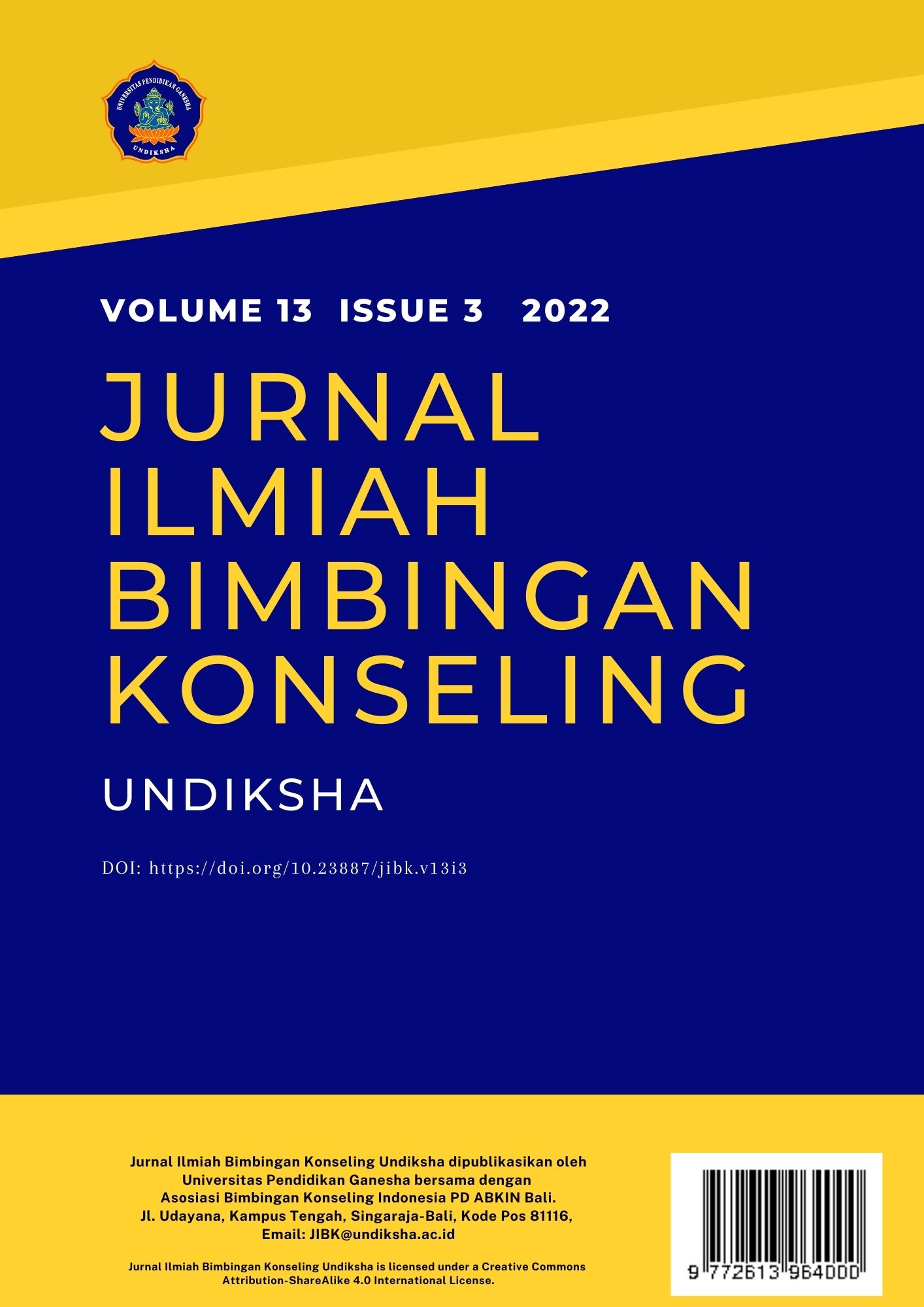Konseling Behavioral dengan Teknik Latihan Asertif untuk Meningkatkan Konsep Diri
DOI:
https://doi.org/10.23887/jibk.v13i3.51973Keywords:
Konseling behavioral, Latihan asertif, Konsep diriAbstract
This study aims to determine whether the application of behavioral counseling with assertive training techniques can improve self-concept in students who have low self-concept. This research is an action research counseling guidance. The subjects in this study were 10 class IXB students at SMP Negeri 4 KubuAddan for the 2018/2019 academic year. To obtain data, a questionnaire distribution method was used to determine the number of children who had low self-concept. This study was conducted in two cycles, while the results of counseling were evaluated using a self-concept questionnaire. The data obtained were processed by descriptive analysis. The results showed that: in the first cycle, there were 4 students who achieved the criteria above 65% with an average increase of 19.49%, while 6 students were still below the 65% criteria. In the second cycle, 6 students who had not reached the 65% criteria in the first cycle, experienced an increase of more than 65% with an average increase of 13.84% in the second cycle. From the results of the study showed an increase in students after being given behavioral counseling with assertive training techniques. From the results of the study, it can be concluded that behavioral counseling with assertive training techniques can improve students' self-concept.
Abstrak:
Penelitian ini bertujuan untuk mengetahui apakah penerapan konseling behavioral dengan teknik latihan asertif dapat meningkatkan konsep diri pada siswa yang memiliki konsep diri rendah.Penelitian ini adalah penelitian tindakan bimbingan konseling. Subyek dalam penelitian ini adalah 10 orang siswa kelas IXB SMP Negeri 4 Kubutambahan Tahun Pelajaran 2018/2019. Untuk memperoleh data, digunakan metode penyebaran kuesioner agar diketahui jumlah anak yang memiliki konsep diri rendah. Penelitian ini dilakukan dua siklus, sedangkan hasil konseling dievaluasi dengan kuesioner konsep diri. Data yang diperoleh diolah dengan analisis deskriptif. Hasil penelitian menunjukkan bahwa: siklus I diperoleh peningkatan 4 orang siswa yang mencapai kriteria diatas 65% dengan rata-rata peningkatan 19.49%, sedangkan 6 orang siswa masih dibawah kriteria 65%. Pada siklus II, 6 orang siswa yang belum mencapai kriteria 65% pada siklus I, mengalami peningkatan diatas 65% dengan rata-rata peningkatan 13.84% pada siklus II. Dari hasil penelitian menunjukkan adanya peningkatan siswa setelah diberikan konseling behavioral dengan teknik latihan asertif. Dari hasil penelitian dapat disimpulkan bahwa konseling behavioral dengan teknik latihan asertif dapat meningkatkan konsep diri siswa.
References
Arikunto, Suharsimi. 1997. Prosedur Penelitian Suatu Pendekatan Praktek. Edisi Revisi V. Cetakan ke-12. Jakarta: Rineka Cipta.
Bungin, Burhan. 2005. Metodologi Penelitian Kuantitatif. Jakarta: Kencana.
Burker, Herbert, Stefflre. 1979. Theories Of Counselling. USA: Mc Graw Hill. Inc.
Corey, Gerald. 2005. Teori dan Praktek Konseling dan psikoterapi. Bandung: Refika Aditama.
Dantes, Nyoman. 2012. Metode Penelitian. Yogyakarta: CV Andi offset
Dharsana, Ketut.2007. Dasar-Dasar Konseling Seri 2.Singaraja: Undiksha.
Dian Frihatini, Ni Luh Putu. 2011. Efektivitas Konseling Behavioral dengan Teknik Relaksasi dalam Desensitisasi Sistematik untuk Meminimalisasi Kecemasan dalam Belajar Siswa Kelas X SMA Negeri 1 Negara Tahun Pelajaran 2011/2012. Skripsi (tidak diterbitkan). Singaraja: Fakultas Ilmu Pendidikan Universitas Pendidikan Ganesha Singaraja.
Hadeli. 2006. Metode Penelitian Kependidikan. Ciputat: Quantum Teaching.
Koyan, I Wayan. 2012. Evaluasi Program Pendidikan. Singaraja: Program Pasca Sarjana Undiksha.
Hurlock, Elizabeth.B. 1978. Perkembangan Anak Jilid 2. Jakarta: Erlangga.
Kunandar. 2009. Langkah Mudah PTK sebagai Pengembangan Profesu Guru. Jakarta: Rajawali.
Mappiare, Andi. 1992. Pengantar Konseling dan Psikoterapi. Jakarta: Raja Grafindo Persada.
Margono,S. 2005. Metodologi Penelitian Pendidikan. Jakarta: Rineka Cipta.
Nelson, Richard, Jones. 1982. The Theory And Practice Of Counselling Psychology. London: Holt Rinehart and Winston.
Nia Karmayani, Putu. 2011. Hubungan Konsep Diri dan Penyesuaian Diri dengan Kemandirian Belajar pada Siswa Kelas VIII SMP Negeri 1 Busungbiu Tahun Pelajaran 2010/2011. Skripsi (tidak diterbitkan). Singaraja: Fakultas Ilmu Pendidikan Universitas Pendidikan Ganesha Singaraja.
Nurkancana,Wayan, dan PPN. Sunartna.1990. Evaluasi Hasil Belajar. Surabaya:Usaha Nasional.
Prayitno & Erman Amti. 2004. Dasar-dasar Bimbingan dan Konseling. Jakarta: Rineka Cipta.
Sedanayasa, Gede,dkk. 2009. Buku Ajar Dasar-Dasar Bimbingan Konseling. Singaraja: Undiksha.
Slameto. 2003. Belajar dan Faktor-faktor yang Mempengaruhi. Jakarta: Rineka Cipta.
Suardana, I Made. 2012. Penggunaan Konseling Behavioral dengan Teknik Asertif untuk Menumbuhkan Rasa Percaya Diri Siswa dalam Menghadapi Ujian Akhir Pembelajaran pada Kelas XI Tata Boga 1 SMK Negeri 2 Singaraja Tahun Pelajaran 2011/2012. Skripsi (tidak diterbitkan). Singaraja: Fakultas Ilmu Pendidikan Universitas Pendidikan Ganesha Singaraja.
Sukardi. 2004. Metodologi Penelitian Pendidikan Kompetensi dan Praktiknya. Jakarta: Bumi aksara.
Wirawan, Sarwito. 1989. Psikologi Remaja. Jakarta: Raja Grafindo Persada.
Yusuf, Syamsu dkk. 2006. Landasan Bimbingan dan Konseling. Bandung: PT Remaja.
Downloads
Published
Issue
Section
License
Copyright (c) 2022 I Nyoman Suardika

This work is licensed under a Creative Commons Attribution 4.0 International License.
Jurnal Ilmiah Bimbingan Konseling Undiksha is an Open Access Journal. The authors who publish the manuscript in this journal agree to the following terms:
JIBK is licensed under a Creative Commons Attribution 4.0 International License. This permits anyone to copy, redistribute, remix, transmit and adapt the work provided the original work and source is appropriately cited.
This means:
Jurnal Ilmiah Bimbingan Konseling is licensed under a Creative Commons Attribution 4.0 International License.
(1) Under the CC-BY license, authors retain ownership of the copyright for their article, but authors grant others permission to use the content of publications in JIBK in whole or in part provided that the original work is properly cited. Users (redistributors) of JIBK are required to cite the original source, including the author's names, JIBK as the initial source of publication, year of publication, volume number, issue, and Digital Object Identifier (DOI); (2) The authors are the copyright owner of the article, and the author grants the JIBK held the first publication right.









.png)

.jpg)
